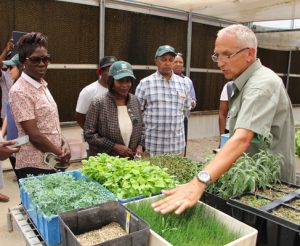Life On Land


Home » Life On Land » SDG 15 -Environmental Protection Continuity
SDG 15 -Environmental Protection Continuity
Governments come and go; unfortunately, all too often vital issues fall by the wayside in the power transfer. A week into Israel’s new government, advancing climate action and other environment-related sustainable development goals seems to remain high on the country’s agenda.
Speaking at the ministerial exchange ceremony last week, remarks by the incoming Environmental Protection Minister appeared to signal continuity from her predecessor:
“The climate crisis is here. We have only a few years left before we reach a point of no return. It is a matter of now or never. It is a basic position of this government, which I have fought for, to pass a comprehensive new law regarding the marketing of carbon, to cease using fossil fuels, including gas, and to set ambitious goals for the use of renewable energy – to reach by the year 2030 a goal of 40% use of renewable energy at least and to eliminate polluting emissions by 2020.”


Controversy surrounding a plan to move Gulf oil to Europe via Israel perhaps best reflects the continuity between the new and previous governments. Alongside opposition by environmental groups, the new Environmental Protection Minister reiterated her predecessor’s criticism of the deal:
“I intend to bring before the government a proposal to void the Eilat Ashkelon Pipeline agreements and to enforce Israeli supervision of the environmental dangers of the pipeline. The port of Eilat is in real danger because of the pipeline. Israel does not have to serve as an oil-bearing bridge for other nations.”
A number of government ministries share responsibility for improving the country’s environmental reality. Recognizing the importance of inter-ministerial cooperation, the Transportation Ministry reportedly will include Environmental Protection Ministry representatives in its decision-making process. In addition to environmental aspects, the new Transportation Minister emphasized upon assuming her position the role that improved public transportation can also play in advancing social equality – particularly with regard to employment opportunities, housing, gender and age.
Increasingly pro-environment policies on the part of the Israeli Government, reflecting its solid commitment to realizing the United Nations’ SDGs, have also been noticed by watchdog groups outside the country. Indeed, Israel’s recent decision to ban animal fur sales has been warmly welcomed by the organization “People for the Ethical Treatment of Animals,” better known as PETA.
It appears that a convergence of views on environmental issues between government and civil society accelerated especially during the past year. Demonstrating this trend, the Environmental Protection Ministry recently announced support for 22 relevant organizations totaling 4.55 million shekels. These groups include the Arava Institute for Environmental Studies (AIES), which brings Jordanians, Palestinians, Israelis and others together for environmental studies (its incoming CEO previously served as the Ministry of Science’s acting chief scientist, the first in such a position from Israel’s Arab community); as well as Adam Teva V ‘Din (People , Nature & Law), which acts to “use the power of law to protect everyone’s rights to a safe and healthy environment” and the Society for the Protection of Nature in Israel.
Related articles


SDG 15- Farmster – connecting farmers directly to consumers
Life On Land Farmster is an innovative and forward-thinking application which is reimagining some of the fundamental problems that the agricultural sector faces. With CEO Adam


SDG15- Israel Brings Tree Technology to Kenya
Life On Land SDG 15- Israel Brings Tree Technology to Kenya The KKL-JNF (Keren Keyemeth LeIsrael – Jewish National Fund) has historically been the official


SDG 15- Beewise – Redesigning Sustainable Beehives, for the 21st Century
Life On Land Introducing Beewise In recognising the fundamental role bees play in ensuring our current and future wellbeing, the Israeli-based company, Beewise, has created


















